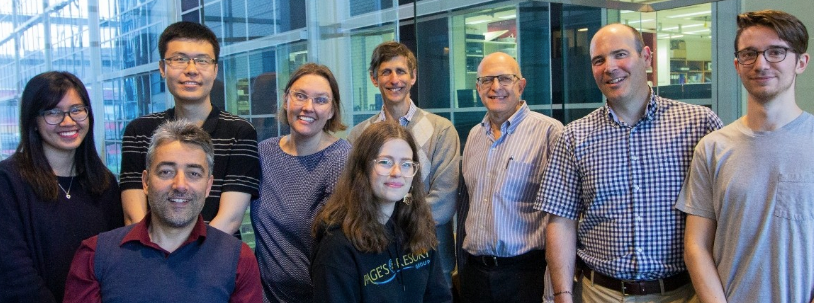University of Alberta AI Chatbot to Help Families of Kids with Neuro Issues
Chatbot is just the latest of the machines tasked to help patients.

Francois Bolduc (second from right) and his University of Alberta team are helming a project to develop an AI chatbot for families with children who have neurodevelopmental disabilities. (Courtesy: University of Alberta)
A mother doesn’t know what to do. Her autistic son is having severe difficulties, leading to dramatic problems at home. But they live in a rural part of western Canada, and a specialist appointment is still weeks away.
Soon this mother will be able to ask for immediate help — courtesy of an artificial intelligence (AI)-powered chatbot offering proven advice from the literature.
The AI machine will be able to guide the mother and son in their most crucial time to the best way to deal with the dynamic domestic situation, according to the developers, led by François Bolduc, M.D., a pediatric neurologist at the University of Alberta.
While a growing number of healthcare chatbots are proposed and being built, this one is dealing with a level of human sensitivity surrounding human development which may set it apart.
“That’s what’s kind of unique about this project, many projects are born from AI, but do not necessarily have tight connection with the health of the education sector, which is kind of a very strong thing in my mind, because it gives us this qualified way of processing the questions of that mom,” said Bolduc, in a recent interview with Inside Digital Health™.
The development of the chatbot is underway through a three-year, $1.5-million grant from the Canadian Institutes of Health Research and Natural Sciences and Engineering Research Council of Canada, as well as a development grant from Kids Brain Health Network. Joining Bolduc and his team will be those from the University of Calgary, McGill University, and York University.
Key to the concept is providing resouces as early as possible — resources offered at the clinic, but which can now be accessible from the comfort of the home, said Bolduc.
The guidance would point to vetted Internet sources, with medical and behavioral advice that is tried and true from previous cases.
Although some skepticism of the burgeoning healthcare chatbot market has been reported, the timeliness and sourced data could make a huge difference to get families in a difficult domestic situation the help they need, at the moment its most needed.
“A chatbot is perfectly suited for that. It’s there 24/7, you can access it when you have time, you can quit it and come back to it,” he said. “This is really trying to improve quality of life and improving functionality. It’s not going to change the individual… but I think it will make the world a little bit easier for individuals with neurodevelopmental disabilities to live in.”
Get the best insights in digital health directly to your inbox.
RELATED
Creating Trust Around AI Chatbots